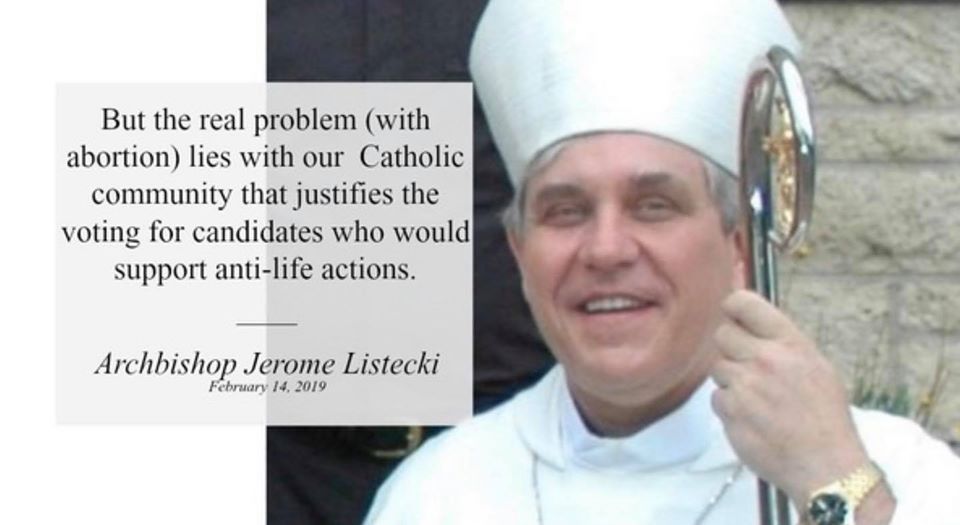ABORTION: The intentional and direct killing of an unborn (pre-born) human person. Abortion is one of several intrinsic evils identified by the Church and known thought reason and the natural moral law.
I vote conscientiously because I am a person of faith and a citizen of the United States.
My conscience was formed through studying scripture, teaching of the Church, examination of the facts and prayer.
I believe when we vote we must put the facts in some sort of order with the Issues that affect human lives as the first and foremost.
While there are many moral issues before us, every issue is not equal. No issue out ways the issue of abortion and euthanasia.
★ Issues that directly affect
human lives—such as abortion and
euthanasia—are fundamental and demand
serious consideration.
Family life is what holds us together, the foundation of the family and an essential core element with the first amendment is the essential core of a flourishing society.
★ Our Constitution heralds religious
liberty in the First Amendment, yet
increasingly people of faith are having to fight
to retain this basic right.
★ There is a move in the nation to redefine
marriage. The marriage of a man and a
woman is the foundation of the family and an
essential core element of a flourishing society.
★ Our duty to enforce the laws and protect those who can not protect themselves.
I believe it is our duty to support the police officer and those who are working daily to enforce our laws. If we support those (police and those that are enforcing our laws) we are supporting the poor and defenseless who have no way of protecting themselves.
Stopping crime is supporting those who have no means of defending themselves and living a healthier life.
What good is it If you go out and feed a million people and support killing five million in abortion, euthanasia and crime.
THE HUMAN CONSCIENCE: “Conscience is a judgment of reason whereby the human person recognizes the moral quality of a concrete act that his is going to perform, is in the process of performing, or has already completed” (CCC, 1778)
FALSE MORAL EQUIVALENCY: refers to a failure to make “ethical distinctions between different kinds of issues involving human life and dignity” (FCFC, No 28)
FORMAL COOPERATION, IN WHATEVER FORM, IS ALWAYS MORALLY WRONG.
(USCCB, Ethical and Religious Directives for Catholic Healthcare Services, http://www.usccb.org/about/doctrine/ethical-andreligious-directives/upload/ethical-religious-directives-catholic-health-service-sixth-edition2016-06.pdf, 24)
INTRINSIC EVILS: acts which are in themselves evil in their object of choice. Acts which are morally evil in and of themselves and therefore always wrong. Examples: abortion, euthanasia, same-sex “marriage,” adultery.
MATTERS OF PRUDENTIAL JUDGMENT: pertains to non-intrinsically evil issues on which Catholics can have a legitimate diversity of opinion. Examples: taxation, economic, foreign trade, health care, and immigration policies.
REMOTE MATERIAL COOPERATOR: the cooperator does not intend the evil act of the principle agent, but Nevertheless provides some type of remote assistance to the evildoer. In order for remote material cooperation to be morally permissible, a proportionate reason for cooperation is required to be present and one must do his best to avoid scandalizing others. Example: a Catholic voter disagrees with the immoral, intrinsically evil positions of both candidates in question but votes for one of the two candidates because he poses the least risk to human life and, at the same time, is most likely to advance some morally good policies. It is assumed there is reasonable certainty that one of the two candidates will be elected. The Catholic would also explain why his voting choice is morally permissible to others in order to avoid scandal, should they be aware of his vote.
PROPORTIONATE REASON: sometimes called “sufficient reason.” Not to be confused with proportionalism, which is a morally illicit system of ethics that disregards the moral nature of concrete acts. Proportionate reason refers to a kind of “counterbalance” to the foreseen evil that will occur through unintended cooperation with the principle agent. Proportionate reason means a good is achieved that outweighs the foreseen and unintended evil, or a greater evil is avoided in comparison to the lesser evil that is unintentionally permitted. Factors to be considered alongside proportionate reason are proximity, the gravity of the foreseen evil, the essentialness of the cooperation, alternative courses of action reasonably available, and other prudential judgments.
Catholic Online
https://www.catholic.org
Catholic Online New Jerusalem Bible
http://www.catholic.org/bible/
Catholic Encyclopedia
http://www.catholic.org/encyclopedia/
Saints
https://www.catholic.org/saints/
Prayers
https://www.catholic.org/prayers
Abort73.com. “U.S. Abortion Statistics.”
https://www.abort73.com/abortion_facts/us_abortion_statistics/
Catechism of the Catholic Church. Second Edition. Vatican City: Libreria Editrice Vaticana, 1994.
NRL News Today. “Abortion Statistics: United States Data and Trends.”
https://www.nationalrighttolifenews.org/2020/08/abortion-statistics-united-states-data-and-trends-4/
USCCB. Forming Consciences for Faithful Citizenship. https://www.usccb.org/resources/formingconsciences-faithful-citizenship-pdf

